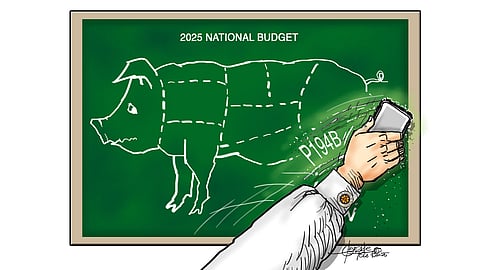
- NEWS
- the EDIT
- COMMENTARY
- BUSINESS
- LIFE
- SHOW
- ACTION
- GLOBAL GOALS
- SNAPS
- DYARYO TIRADA
- MORE

The Ayuda Para sa Kapos ang Kita (AKAP) program was conceived as a lifeline for the most vulnerable members of society, addressing poverty and unemployment with cash assistance.
However, its noble intentions have been overshadowed by allegations of abuse as critics claim it is being weaponized for political gain. Reports suggest that AKAP has earned a new moniker, Ayuda para sa Kaibigan sa Politika, reflecting how some leaders manipulate the program to secure political loyalties. Such practices undermine the program’s integrity, erode public trust, and distort the principles of democracy.
The problem lies in the selection process for beneficiaries. Ideally, AKAP recipients should be chosen through a transparent mechanism based on clearly defined criteria such as income level, employment status and overall need.
Reports, however, indicate that some barangay councils have raised concerns over the lack of proper training and guidelines for those tasked with identifying beneficiaries. Instead, partisan considerations allegedly dominate decision-making, with assistance prioritized for those aligned with local political leaders.
This favoritism has turned AKAP into a political tool rather than a public service. The aid, intended as a social equalizer, becomes a carrot dangled before impoverished communities to secure votes for incumbent politicians and their allies.
By exploiting the desperation of the poor, these leaders manipulate AKAP into patronage politics, perpetuating a cycle of dependence. This tactic not only violates the program’s objectives but entrenches the very inequalities it seeks to address.
Moreover, the timing of these allegations — amid the lead-up to the 2025 elections — raises red flags. It is no coincidence that such schemes are emerging as politicians seek to strengthen their hold on their constituencies. Cash aid programs like AKAP offer a convenient avenue to curry favor with voters, bypassing the arduous process of implementing long term, sustainable poverty alleviation measures.
Instead of addressing structural issues, politicians leverage short-term handouts to project themselves as benefactors, ensuring loyalty at the ballot box.
The call for the Ombudsman to investigate these irregularities is both timely and necessary. A thorough probe can establish accountability, deter future abuses, and restore the integrity of the AKAP program. Furthermore, the investigation must extend beyond local leaders to include national policymakers who may have facilitated or turned a blind eye to these practices. Without accountability, the credibility of government aid programs as tools for social justice will continue to erode.
To safeguard programs like AKAP, reforms are essential. First, beneficiary selection processes should be depoliticized, relying on third-party organizations or non-governmental agencies to ensure fairness and transparency. Second, implementing strict oversight mechanisms, including digital tracking and public reporting, can prevent manipulation. Finally, educating citizens about their rights regarding government aid is crucial to empower them against coercion and exploitation.
The broader implications of AKAP’s politicization are deeply troubling. If programs designed to alleviate poverty are co-opted for political gain, the government risks losing the trust of the people. Citizens will no longer view these initiatives as genuine efforts to uplift their lives but as cynical tools of manipulation. This erosion of trust will further alienate the marginalized sectors, exacerbating societal divisions.
The allegations surrounding AKAP, therefore, highlight the urgent need to address the intersection of poverty and politics in the Philippines. Turning aid into a political weapon not only betrays the program’s intended beneficiaries but also undermines the democratic process.
The government must act decisively to investigate and reform AKAP, to ensure that it serves its true purpose: To provide ayuda para sa kapos, not ayuda para sa kaibigan sa politika (aid for the needy, not aid for friends in politics).
